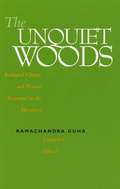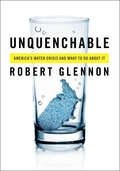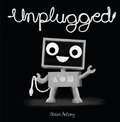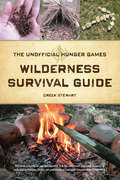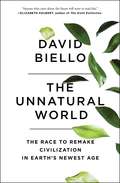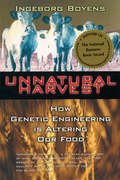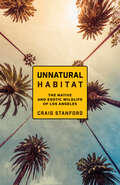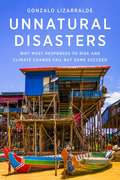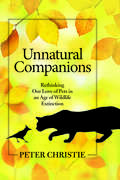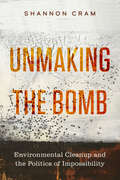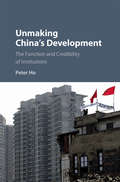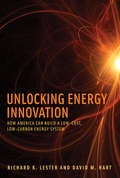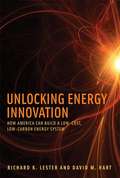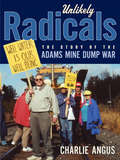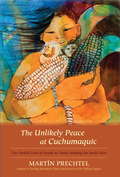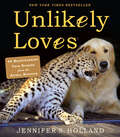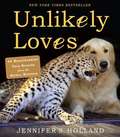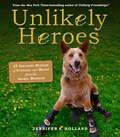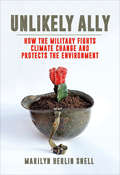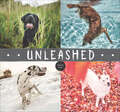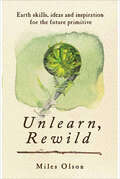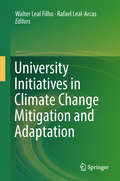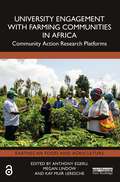- Table View
- List View
The Unquiet Woods: Ecological Change and Peasant Resistance in the Himalaya
by Ramachandra GuhaThe Unquiet Woods, Ramachandra Guha's path breaking study of peasant movements against commercial forestry, offers a new epilogue that brings the story of Himalayan social protest up-to-date, reflecting the Chipko movement's continuing influence in the wider world.
Unquenchable: America's Water Crisis and What To Do About It
by Robert Jerome GlennonIn the middle of the Mojave Desert, Las Vegas casinos use billions of gallons of water for fountains, pirate lagoons, wave machines, and indoor canals. Meanwhile, the town of Orme, Tennessee, must truck in water from Alabama because it has literally run out. Robert Glennon captures the irony--and tragedy--of America's water crisis in a book that is both frightening and wickedly comical. From manufactured snow for tourists in Atlanta to trillions of gallons of water flushed down the toilet each year, Unquenchable reveals the heady extravagances and everyday inefficiencies that are sucking the nation dry. The looming catastrophe remains hidden as government diverts supplies from one area to another to keep water flowing from the tap. But sooner rather than later, the shell game has to end. And when it does, shortages will threaten not only the environment, but every aspect of American life: we face shuttered power plants and jobless workers, decimated fi sheries and contaminated drinking water. We can't engineer our way out of the problem, either with traditional fixes or zany schemes to tow icebergs from Alaska. In fact, new demands for water, particularly the enormous supply needed for ethanol and energy production, will only worsen the crisis. America must make hard choices--and Glennon's answers are fittingly provocative. He proposes market-based solutions that value water as both a commodity and a fundamental human right. One truth runs throughout Unquenchable: only when we recognize water's worth will we begin to conserve it.
Unplugged
by Steve AntonyA delightful picture book about the wonders of all the fun you can have inside AND outside, by the award-winning Steve Antony, author of the bestselling Please Mr Panda.BLIP spends all day plugged into her computer, playing games and having fun. But when there is a POWER CUT, Blip goes down the stairs and out the front door, where she discovers playing games and having fun . . . OUTSIDE. Isn't it wonderful to be UNPLUGGED? By Steve Antony, winner of the Oscar's First Book Prize, nominated for the Kate Greenaway Medal and shortlisted for the Waterstone's Children's Book Prize."[A] gorgeous piece of propaganda for going outside." & "[T]he book is so elegantly illustrated and cleverly conceived."
The Unofficial Hunger Games Wilderness Survival Guide: A Wilderness Skills Manual For Surviving The Arena
by Creek StewartPut the Odds in Your Favor! Train like a Tribute before you enter the Arena using this wilderness survival guide--you don't have to live in Panem to put these survival skills to use. Experience the adventure of life in District 12 by learning and practicing the survival skills used by Katniss, Peeta, Gale and their friends. Some of the survival skills you'll learn: Building temporary shelters to protect from rain, cold, wind and sun. Finding and purifying water--even when there are no streams or lakes nearby. Building and using fire for cooking, signaling, warmth and making tools. Identifying and cooking wild edible plants. Building Gale's famous twitch-up snares. Peeta's camouflage techniques. Katniss's hunting and stalking skills. Making your own survival bow and arrows and other tools. The materials you need to create a forage bag like Katniss's. Survival first aid. Navigation tips and tricks for travel, rescue and evasion. Detailed photos and step-by-step instructions will help you master each skill. The real-life skills found in The Unofficial Hunger Games Wilderness Survival Guide will help you in any wilderness or disaster survival situation. Start your training today.
The Unnatural World: The Race to Remake Civilization in Earth's Newest Age
by David BielloWith the historical perspective of The Song of the Dodo and the urgency of Al Gore's An Inconvenient Truth, a brilliant young environmental journalist argues that we must innovate and adapt to save planet Earth.Civilization is in crisis, facing disasters of our own making on the only planet known to bear life in the vast void of the universe. We have become unwitting gardeners of the Earth, not in control, but setting the conditions under which all of life flourishes--or not. Truly, it's survival of the innovators. The Unnatural World chronicles a disparate band of unlikely heroes: an effervescent mad scientist who would fertilize the seas; a pigeon obsessive bent on bringing back the extinct; a low-level government functionary in China doing his best to clean up his city, and more. These scientists, billionaires, and ordinary people are all working toward saving the best home humanity is ever likely to have. What is the threat? It is us. In a time when a species dies out every ten minutes, when summers are getting hotter, winters colder, and oceans higher, some people still deny mankind's effect on the Earth. But all of our impacts on the planet have ushered in what qualifies as a new geologic epoch, thanks to global warming, mass extinction, and such technologies as nuclear weapons or plastics. The Unnatural World examines the world we have created and analyzes the glimmers of hope emerging from the efforts of incredible individuals seeking to change our future. Instead of a world without us, this history of the future shows how to become good gardeners, helping people thrive along with an abundance of plants, animals, all the exuberant profusion of life on Earth--a better world with us. The current era of humans need not be the end of the world--it's just the end of the world as we know it.
Unnatural Harvest: How Genetic Engineering is Altering Our Food
by Ingeborg BoyensAdvertisers may want us to believe that our food is produced on picturesque farms, but the cold reality is that the plants and animals we consume may be the result of genetic engineering in the laboratories of multinational corporations.Biotechnology brings with it implications for human and animal health, the threat of environmental damage, a possible redefining of our global food system and a Pandora's box of ethical questions. But the consuming public remains virtually unaware of the genetic alterations of their food and what that may hold in store.Thoroughly researched and accessibly written, Unnatural Harvest holds nothing back in telling us how the food we now serve ourselves and our children may be altered and why we should be very concerned.
Unnatural Habitat: The Native and Exotic Wildlife of Los Angeles
by Craig StanfordA guide to the ecosystem famously known as Los Angeles, from a field biologist and longtime San Gabriel Valley resident."A worthy and illuminating entry in the tradition of works exploring urbanization's effect on the environment." —Los Angeles TimesWithin the sprawling metropolis of Los Angeles and its suburbs, residents coexist—often unknowingly—with a bustling mosaic of native and introduced wildlife. Conservationist Craig Stanford, whose research has taken him around the world, now takes a deep dive into the natural history of his Southern California home. Stanford's informed and vivid accounts of more than 150 species entreat us to appreciate the ecological marvels of sagebrush and skunks and skippers, the iconic palms of LA lore, and the mountain lions still roaming the hills.These portraits of the glamorous, humble, irritating, and altogether fascinating species that live alongside Angelenos urge us to recognize that even in a jungle of concrete, we live within nature. Witty and captivating, and combining cutting-edge research with his own critter encounters, Stanford demonstrates the beauty of shaping our cities to support biodiversity, and he warns against the threats that can tip urban ecosystems out of balance, leaving us in a much lonelier world.
Unnatural Disasters: Why Most Responses to Risk and Climate Change Fail but Some Succeed
by Gonzalo LizarraldeStorms, floods, fires, tsunamis, earthquakes, tornadoes, and other disasters seem not only more frequent but also closer to home. As the world faces this onslaught, we have placed our faith in “sustainable development,” which promises that we can survive and even thrive in the face of climate change and other risks. Yet while claiming to “go green,” we have instead created new risks, continued to degrade nature, and failed to halt global warming.Unnatural Disasters offers a new perspective on our most pressing environmental and social challenges, revealing the gaps between abstract concepts like sustainability, resilience, and innovation and the real-world experiences of people living at risk. Gonzalo Lizarralde explains how the causes of disasters are not natural but all too human: inequality, segregation, marginalization, colonialism, neoliberalism, racism, and unrestrained capitalism. He tells the stories of Latin American migrants, Haitian earthquake survivors, Canadian climate activists, African slum dwellers, and other people resisting social and environmental injustices around the world. Lizarralde shows that most reconstruction and risk-reduction efforts exacerbate social inequalities. Some responses do produce meaningful changes, but they are rarely the ones powerful leaders have in mind.This book reveals how disasters have become both the causes and consequences of today’s most urgent challenges and proposes achievable solutions to save a planet at risk, emphasizing the power citizens hold to change the current state of affairs.
Unnatural Companions: Rethinking Our Love of Pets in an Age of Wildlife Extinction
by Peter Christie"Highly compelling...page-turning read" — TNC's Cool Green ScienceWe love our pets. Dogs, cats, birds, reptiles, and other species have become an essential part of more families than ever before—in North America today, pets outnumber people. Pet owners are drawn to their animal companions through an innate desire to connect with other species. But there is a dark side to our domestic connection with animal life: the pet industry is contributing to a global conservation crisis for wildlife—often without the knowledge of pet owners. In Unnatural Companions, journalist Peter Christie issues a call to action for pet owners. If we hope to reverse the alarming trend of wildlife decline, pet owners must acknowledge the pets-versus-conservation dilemma and concede that our well-fed and sheltered cats too often prey on small backyard wildlife and seemingly harmless reptiles released into the wild might be the next destructive invasive species. We want our pets to eat nutritionally healthy food, but how does the designer food we feed them impact the environment? Christie's book is a cautionary tale to responsible pet owners about why we must change the ways we love and care for our pets. It concludes with the positive message that the small changes we make at home can foster better practices within the pet industry that will ultimately benefit our pets' wild brethren.
Unmaking the Bomb: Environmental Cleanup and the Politics of Impossibility (Critical Environments: Nature, Science, and Politics #14)
by Shannon CramWhat does it mean to reckon with a contaminated world? In Unmaking the Bomb, Shannon Cram considers the complex social politics of this question and the regulatory infrastructures designed to answer it. Blending history, ethnography, and memoir, she investigates remediation efforts at the Hanford Nuclear Reservation, a former weapons complex in Washington State. Home to the majority of the nation's high-level nuclear waste and its largest environmental cleanup, Hanford is tasked with managing toxic materials that will long outlast the United States and its institutional capacities. Cram examines the embodied uncertainties and structural impossibilities integral to that endeavor. In particular, this lyrical book engages in a kind of narrative contamination, toggling back and forth between cleanup's administrative frames and the stories that overspill them. It spends time with the statistical people that inhabit cleanup's metrics and models and the nonstatistical people that live with their effects. And, in the process, it explores the uneven social relations that make toxicity a normative condition.
Unmaking China’s Development: The Function and Credibility of Institutions
by Peter HoWhy would the removal of authoritarian institutions in some developing countries lead to sustained socio-economic crisis, while others experience explosive growth despite "persisting" informal, insecure and rent-seeking institutional arrangements? A key to solving this enigma lies in understanding China, a country where the paradoxes of development are highly visible. Peter Ho argues that understanding China's economy necessitates an analytical refocusing from Form to Function, detached from normative assumptions about institutional appearance and developing instead a "Credibility Thesis". In this reading, once institutions endogenously emerge and persist through actors' conflicting interactions, they are credible. Ho develops this idea theoretically, methodologically, and empirically by examining institutions around the sector that propelled, yet, simultaneously destabilizes development: real estate - land, housing and natural resources. Ho shows how this sector can further both our understanding of institutions and issues of capital, labor, infrastructure and technology.
Unlocking Energy Innovation: How America Can Build a Low-Cost, Low-Carbon Energy System
by Richard K. Lester David M. HartExperts outline a plan to overhaul the U.S. energy innovation system for accelerated, large-scale adoption of reliable, low-cost, low-carbon energy technologies.Energy innovation offers us our best chance to solve the three urgent and interrelated problems of climate change, worldwide insecurity over energy supplies, and rapidly growing energy demand. But if we are to achieve a timely transition to reliable, low-cost, low-carbon energy, the U.S. energy innovation system must be radically overhauled. Unlocking Energy Innovation outlines an up-to-the-minute plan for remaking America's energy innovation system by tapping the country's entrepreneurial strengths and regional diversity in both the public and private spheres. “Business as usual” will not fill the energy innovation gap. Only the kind of systemic, transformative changes to our energy innovation system described in this provocative book will help us avert the most dire scenarios and achieve a sustainable and secure energy future.
Unlocking Energy Innovation
by Richard K. Lester David M. HartEnergy innovation offers us our best chance to solve the three urgent and interrelated problems of climate change, worldwide insecurity over energy supplies, and rapidly growing energy demand. But if we are to achieve a timely transition to reliable, low-cost, low-carbon energy, the U. S. energy innovation system must be radically overhauled. Unlocking Energy Innovation outlines an up-to-the-minute plan for remaking America's energy innovation system by tapping the country's entrepreneurial strengths and regional diversity in both the public and private spheres. The authors map three waves of energy innovation to show how we can speed up the introduction of new technologies and business models and accelerate their deployment on a massive scale. "Business as usual" will not fill the energy innovation gap. Nor will wishful thinking--common enough today, with politicians and others talking up some technologies, talking down others, and claiming that if we price it, or if we mandate it, or if we simply say it often and inspiringly enough, the innovations will flow. Only the kind of systemic, transformative changes to our energy innovation system described in this provocative book will help us avert the most dire scenarios and achieve a sustainable and secure energy future.
Unlikely Radicals: The Story of the Adams Mine Dump War
by Charlie AngusFor twenty-two years politicians and businessmen pushed for the Adams Mine landfill as a solution to Ontario’s garbage disposal crisis. This plan to dump millions of tonnes of waste into the fractured pits of the Adams Mine prompted five separate civil resistance campaigns by a rural region of 35,000 in Northern Ontario. Unlikely Radicals traces the compelling history of the First Nations people and farmers, environmentalists and miners, retirees and volunteers, Anglophones and Francophones who stood side by side to defend their community with mass demonstrations, blockades, and non-violent resistance.
The Unlikely Peace at Cuchumaquic
by Martin PrechtelMartín Prechtel's experiences growing up on a Pueblo Indian reservation, his years of apprenticing to a Guatemalan shaman, and his flight from Guatemala's brutal civil war to life in the U.S. inform this lyrical blend of memoir, cultural commentary, and spiritual call to arms. The Unlikely Peace at Cuchumaquic is both an epic story and a cry to the heart of humanity based on the author's realization that human survival depends on keeping alive the seeds of our "original forgotten spiritual excellence." Prechtel relates our current state of ecological crisis to the rapid disappearance of biodiversity, indigenous cultures, and shared human values. He demonstrates how real human culture is exterminated when real (not genetically modified) seeds are lost. Like plants that become extinct once their required conditions are no longer met, authentic, unmonetized human cultures can no longer survive in the modern world. To "keep the seeds alive"--both literally and metaphorically--they must be planted, harvested, and replanted, just as human culture must become truly engaging and meaningful to the soul, as necessary as food is to the body. The viable seeds of spirituality and culture that lie dormant within us need to "sprout" into broad daylight to create real sets of cultures welcome on Earth.From the Hardcover edition.
Unlikely Loves: 43 Heartwarming True Stories from the Animal Kingdom (Unlikely Friendships)
by Jennifer S. HollandUnlikely Friendships is the phenomenal New York Times bestseller that’s spent 44 weeks on the list and has 615,000 copies in print. It’s struck a chord with media, from CBS This Morning to USA Today, and Temple Grandin has praised it as “amazing. It shows the power of friendship.” Now its author, Jennifer Holland, who writes about animal relationships with insight, compassion, and a fine narrative touch, explores animal attachments that, in human terms, can only be called love. Packed with beautiful, breathtaking full-color photographs, Unlikely Loves is a celebration of love between species. Here are stories of parental love, like the Dalmatian who mothers a newborn lamb—a lamb that just happens to be white with black spots! Stories of playful love, including the fox and the hound who become inseparable. And stories of orphaned animals who have found family-like ties in unexpected combinations, like the elephant who’s bonded with sea lions, goats, and other animals in her walks around the Oregon Zoo.Ms. Holland has interviewed scientists, zoologists, and animal caretakers from around the world, tracking down firsthand sources and eyewitnesses. The stories are written with journalistic integrity and detail—and always filled with the author’s deep affection for her subjects.
Unlikely Loves: 43 Heartwarming True Stories From The Animal Kingdom
by Jennifer S. HollandUnlikely Friendships is the phenomenal New York Times bestseller that’s spent 44 weeks on the list and has 615,000 copies in print. It’s struck a chord with media, from CBS This Morning to USA Today, and Temple Grandin has praised it as “amazing. It shows the power of friendship.” Now its author, Jennifer Holland, who writes about animal relationships with insight, compassion, and a fine narrative touch, explores animal attachments that, in human terms, can only be called love. Packed with beautiful, breathtaking full-color photographs, Unlikely Loves is a celebration of love between species. Here are stories of parental love, like the Dalmatian who mothers a newborn lamb—a lamb that just happens to be white with black spots! Stories of playful love, including the fox and the hound who become inseparable. And stories of orphaned animals who have found family-like ties in unexpected combinations, like the elephant who’s bonded with sea lions, goats, and other animals in her walks around the Oregon Zoo. Ms. Holland has interviewed scientists, zoologists, and animal caretakers from around the world, tracking down firsthand sources and eyewitnesses. The stories are written with journalistic integrity and detail—and always filled with the author’s deep affection for her subjects.
Unlikely Heroes: 37 Inspiring Stories of Courage and Heart from the Animal Kingdom (Unlikely Friendships)
by Jennifer S. HollandIn her heartwarming New York Times bestsellers Unlikely Friendships and last year’s Unlikely Loves, Jennifer Holland revealed the surprising emotional bonds that exist between animals of different species. Her books spent dozens of weeks on bestseller lists and caught the attention of major media from CBS This Morning to USA Today. Why? Because she opened our eyes to the rich inner lives of animals, showing us that the power of love and friendship is not for humans only. In Unlikely Heroes, Ms. Holland uncovers and celebrates yet another side of animals that we often think belongs primarily to people—heroism, that indefinable quality of going above and beyond, often for altruistic reasons, often at great personal risk. These 37 inspiring true tales show animals whose quick acts have saved lives, like the pod of dolphins who protected swimmers in New Zealand from a great white shark by forming a screen around them. There are stories of animals who simply and unselfishly give, like Rojo the llama, who shines his very special light of lovingkindness on the elderly patients in an Oregon rehab center. And there are compelling stories of heroic resilience: like Naki’o, the abandoned puppy who lost all four paws to frostbite but found the grit not only to overcome that terrible hardship but to reclaim the joy of life—that’s him, smiling on the cover of the book.
Unlikely Ally: How the Military Fights Climate Change and Protects the Environment
by Marilyn SnellIn a curious incongruity, the planet's dominant fighting machine, the US military, has taken on a largely unrecognized yet crucial role in preserving California's cultural and ecological treasures. Recruits learn to spot murder holes and fire assault rifles amid one of the most biologically diverse regions in the world, and researchers look to the desert's flora and fauna for inspiration. Environmental stewardship is law on installations throughout the United States, but a few bases in Southern California have taken a more comprehensive approach-one in which energy security and protection of natural and cultural resources are embedded in the concept of national defense. With journalist Marilyn Berlin Snell as our guide, we explore a culture informed as much by the natural world as by human ideas of leadership.
Unlikely Ally: How the Military Fights Climate Change and Protects the Environment
by Marilyn Berlin SnellAn environmental journalist reveals how some California military bases are leading the charge in the fight against climate change. In California, the US military has begun to redefine how our national security operations relate to the destabilizing effects of climate change. Several bases have taken on a largely unrecognized yet crucial role in renewable-energy innovation and in preserving cultural and natural treasures. These facilities are going beyond environmental stewardship to align national defense with energy security and the protection of endangered species. In Unlikely Ally, environmental journalist Marilyn Berlin Snell takes readers through these bases to examine what twenty-first-century sustainable-energy infrastructure looks like; whether combat readiness and species protection can successfully coexist; how cutting-edge technology and water-conservation practices could transform life in a resource-constrained world; and how the Department of Defense's scientific research into the metabolic secrets of the endangered desert tortoise could speed human travel to Mars.
Unleashed
by Amanda Jones&“The unbridled joyousness of the dogs in Unleashed is simply heart-expanding . . . A delight through and through.&” —Modern Dog Magazine Dogs are in their natural element when they&’re playing outdoors. Pet photographer Amanda Jones captures this unbridled joy perfectly in this collection of photographs. Set against the backdrop of four distinct seasons—each with its own color palette and lush backdrops—these dogs are clearly having their favorite days in their favorite places. This handsome book showcases the energy and character of a diverse group of dogs as they run, jump, and play outdoors all year long.
Unlearn, Rewild: Earth Skills, Ideas and Inspiration for the Future Primitive
by Miles OlsonPicture a world where humans exist, like all other living things, in balance. Where there is no separation between "human" and "wild." Unlearn, Rewild boldly envisions such a world, probing deeply into the cultural constraints on our ability to lead truly sustainable lives and offering real, tangible tools to move toward another way of living, seeing, and thinking. Part philosophical treatise, part hard-core survival guide, this unique and thoroughly unconventional manual blends philosophy with a detailed introduction to a rich assortment of endangered traditional living skills, including: Harvesting and preparing unconventional proteins Feral food preservation Dealing responsibly with waste Natural methods of birth control Tanning and processing animal skins Lyrical, humorous, surprising, enlightening, and thought-provoking by turns, Unlearn, Rewild is essential reading for those who wish to heal themselves and the earth, live gracefully into the future primitive and experience their wildest dreams. Miles Olson has spent the past decade deeply immersed in learning and practicing earth skills. While foraging, hunting, gardening, and gathering for his livelihood, his experiences have given him a unique perspective on rewilding, radical self-reliance, and the impact of civilization on the natural world.
University Initiatives in Climate Change Mitigation and Adaptation
by Walter Leal Filho Rafael Leal-ArcasThis book focuses on the role of higher education institutions in addressing climate change mitigation and adaptation challenges, contributing to the development of this fast-growing field. Further, it includes the results of empirical research and offers ideas regarding on-going and future research initiatives. The contributions also• showcase the research and projects on issues pertaining to climate change at universities from across the globe;• document and promote ideas and experiences acquired in the execution of research projects, especially successful initiatives and best practices; and• introduce methodological approaches and projects that offer a better understanding of climate change across society and economic sectors.The book is structured around two parts: lessons learned from climate change research, education, studies and projects. Each part focuses on mitigation and adaptation respectively, with many responses of the two modalities overlapping.This book is a valuable resource for researchers and practitioners in the fields of environment, human geography, business and economics, as well as academics and students, as it presents education, communication and awareness-raising projects on matters related to climate change at universities in both industrialised and developing countries, often in cooperation with government bodies, NGOs and other stakeholders.
University Engagement with Farming Communities in Africa: Community Action Research Platforms (Earthscan Food and Agriculture)
by Anthony EgeruThis book explains and explores how collaborations can be built and strengthened between African universities and farming communities to address real-world contemporary challenges. The book focuses on Community Action Research Platforms, an approach that has successfully enabled African universities to break free of the ivory tower and prove their relevance to society through deep collaborative engagements in targeted agricultural value chains. Developed in a pan-African network of universities (RUFORUM) focused on capacity building in agriculture, the approach has been tested in diverse settings over the last 15 years. The book draws on the experiences and lessons from 21 different projects initiated by RUFORUM member universities in Benin, Botswana, Ethiopia, Ghana, Kenya, Malawi, Namibia, South Africa, Sudan, Tanzania, Uganda and Zimbabwe. It highlights a critical yet underutilised role for African universities as collaborators and catalysts for multisector solutions. These are solutions that increase productivity and address climate change. They develop livelihoods and resilience in rural communities, as well as promote farmers’ access to markets, innovation and trade while safeguarding biodiversity and enhancing food and nutrition security. The book makes a case for repositioning African universities as fulcrums of development in society. It shares the rich experiences, learnings and scientific findings of diverse researchers, practitioners and students who have been working towards achieving this reality on the ground. This multidisciplinary book holds appeal for university leaders, higher education, agrifood and development specialists, researchers and practitioners, policymakers and development agencies engaged in African agriculture and rural development, higher education and sustainable growth.
University Colloquium: A Sustainable Future
by Florida Gulf Coast UniversityThis book contains extracts from the following books: Last Child in the Woods, Collapse: How Societies Choose to Fail or Succeed, Tomorrow's Biodiversity, A Sand County Almanac, The Swamp: The Everglades, Florida, and the Politics of Paradise, The Everglades: River of Grass, Silent Spring, Hope for Animals and Their World, Earth in Mind: On Education and Environment, and Human Prospect.
